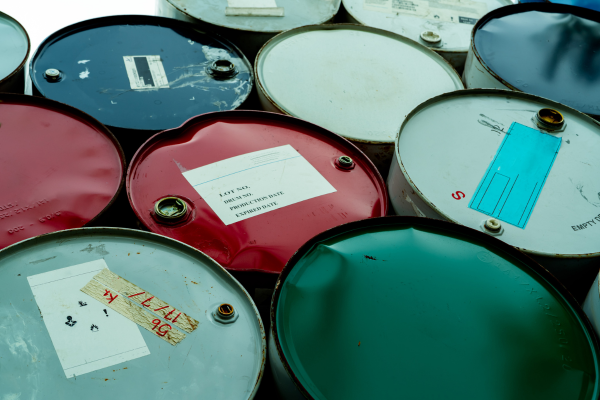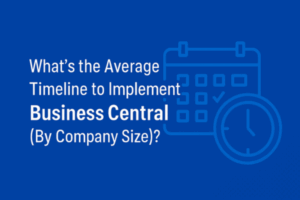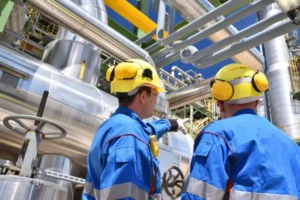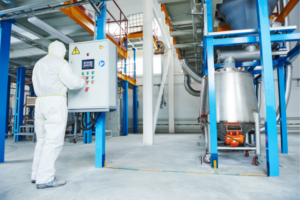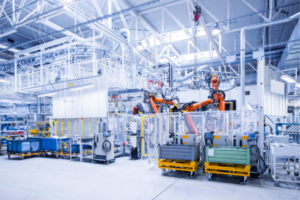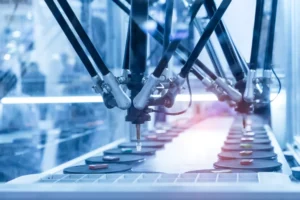Why Reducing Waste and Improving Yield Matters in Chemical Manufacturing
Chemical manufacturing often involves complex formulas, sensitive materials, and tight regulatory oversight. That makes the margin for error incredibly small. Mistakes, inefficiencies, or even slightly off conditions can result in:
- Wasted raw materials
- Lost production time
- Increased rework or scrap
- Non-compliant batches that can’t be sold
Improving yield while reducing waste is critical for hitting financial goals, meeting customer expectations, and reducing environmental impact. Plus, with the rising cost of raw materials and tighter environmental regulations, manufacturers can no longer afford inefficiencies that were once considered tolerable.
How an ERP Helps Chemical Manufacturers Reduce Waste
A well-designed ERP system helps chemical manufacturers minimize waste by identifying inefficiencies, automating manual tasks, and improving visibility across the entire production process.
Real-Time Inventory Management
ERP systems provide real-time insight into raw material and finished goods inventory. This ensures manufacturers use the oldest (or soon-to-expire) materials first, preventing costly spoilage. With proper FIFO or FEFO logic, chemical businesses can dramatically reduce waste due to expired or excess inventory.
In addition, ERP platforms allow teams to set reorder points, safety stock thresholds, and shelf-life alerts, helping avoid over-purchasing or unintentional material hoarding.
Formula and Batch Management
One of the core ways an ERP helps chemical manufacturers reduce waste is through precise formula control. The system can automatically scale formulas based on batch size and factor in real-time variables like material potency. That leads to fewer off-spec batches and less ingredient overuse.
It also simplifies managing formula revisions. When updates are made, they cascade through production plans, ensuring every team is working with the correct formulation without relying on manual version control.
Production Planning and Scheduling
ERP systems align production plans with actual demand, reducing the risk of overproduction. They also optimize equipment usage and minimize changeover time, which cuts down on materials lost during transitions.
By integrating with sales forecasts and historical consumption data, ERP helps planners schedule runs more intelligently, producing just the right amount at the right time.
Quality Control Integration
With quality checkpoints built directly into production workflows, ERP systems help detect issues early and before a full batch is wasted. Automated QC results and hold/release processes reduce rework, scrap, and downtime.
For example, if a test result flags a deviation, the ERP can automatically halt further processing and alert the appropriate personnel, minimizing further waste.
Scrap and Waste Tracking
ERP platforms log all production losses in real-time, giving manufacturers insight into where and why waste occurs. By tracking scrap by shift, equipment, or recipe, companies can spot trends and take corrective action quickly.
This data-driven approach helps organizations go beyond gut feeling and base improvement initiatives on measurable loss patterns.
Industry Stat: In 2022, the United States managed approximately 28.57 billion pounds of production-related TRI-listed chemical waste, with the chemical manufacturing sector responsible for over 54% of this total.
How an ERP Helps Chemical Manufacturers Improve Yield
Beyond reducing waste, ERP systems also drive higher yield by helping manufacturers get more usable product from every batch.
Monitor Yield by Batch and Line
ERP dashboards show yield metrics across different lines, shifts, or recipes. This data helps teams spot high-performing processes and replicate success. Over time, this can establish best practices and standard operating procedures (SOPs) that maximize efficiency.
Historical Data for Process Improvement
ERP systems store detailed production history, enabling root cause analysis and continuous improvement efforts. Manufacturers can adjust mixing times, temperatures, or ingredient concentrations to improve consistency and output.
This kind of retrospective analysis is key for process manufacturers where variability is common and costly.
Optimized Batch Sizes
ERP systems help calculate optimal batch sizes based on capacity, resource availability, and past performance ensuring maximum throughput with minimal waste.
Rather than producing arbitrarily sized batches based on manual estimations, ERP data helps balance the trade-off between production efficiency and inventory holding costs.
Variable Control and Recipe Adjustments
When raw materials vary in quality or potency, ERP systems allow for dynamic adjustments in formulas. That ensures consistent results and avoids yield loss due to unaccounted variability.
Without ERP, these adjustments are often handled manually, increasing the chance of inconsistency and mistakes.
Beyond the Shop Floor: Additional Benefits of ERP
- Cost Savings: Less waste and higher yield mean lower cost per unit
- Sustainability: Reducing material usage and scrap supports environmental goals and ESG targets
- Regulatory Compliance: Accurate batch records and inventory control make audits easier
- Customer Satisfaction: Consistent product quality builds trust and retention, especially in tightly regulated industries
- Cross-Departmental Visibility: With sales, procurement, production, and quality all operating from the same data, decisions become more coordinated and informed
Better Processes, Better Outcomes
Waste is expensive. Poor yield is worse. But both can be improved with the right systems in place. A modern ERP helps chemical manufacturers reduce waste and improve yield by tightening process control, improving visibility, and enabling smarter decisions.
Want to see how ERP can improve your operations? Discover how Alchemy 365 helps chemical manufacturers reduce waste, increase yield, and operate more efficiently than ever.
📌 Related Reading: The Ultimate Guide to ERP for Chemical Manufacturing
